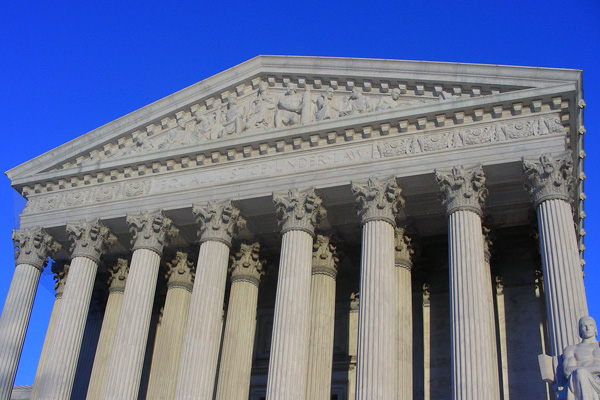U.S. Supreme Court to hear arguments Feb. 28 in Stanford v. Roche
The federal government, several higher education groups, including the Association of American Universities and the American Association for the Advancement of Science, dozens of research universities, the National Venture Capital Association and one of the sponsors of the Bayh-Dole Act, have filed briefs on behalf of Stanford.
A Stanford lawsuit that began as a patent infringement case against a drug company has evolved into a dispute over a federal law that promotes the commercialization of government-sponsored research and protects ownership rights of universities to inventions arising from government-sponsored research.
The federal law, the Bayh-Dole Act, has been the source of billions of dollars of funding to American universities through royalties generated from federally funded inventions. Funds received under the Bayh-Dole Act are required to be used for research, education and payment to the inventors.
The U.S. Supreme Court is scheduled to hear arguments Monday (Feb. 28) on Stanford University v. Roche Molecular Systems et al., a case that could have a significant impact on research universities across the country.
After years of unsuccessfully negotiating with Roche in an attempt to convince the company to acquire a license to Stanford’s patents, Stanford sued Roche in 2005, alleging that its kits for detecting human immunodeficiency virus (HIV) infringed university patents.
A federal district court in San Francisco ruled that Stanford owned the patents under the University and Small Business Patent Procedures Act, better known as the Bayh-Dole Act.
A federal appeals court in Washington, D.C., disagreed, saying Stanford shared ownership of the patents with Roche under its interpretation of the 1980 law.
The Obama administration has urged the Supreme Court to reverse the 2009 appeals court decision.
In a brief filed on behalf of Stanford, acting U.S. Solicitor General Neal Katyal said the decision creates "serious uncertainty" about title to patents, "frustrates the government’s ability to protect the taxpayers’ multibillion-dollar investments in research and development" and undermines efforts by Congress "to ensure that federally funded inventions are used to advance the public interest."
The case concerns ownership of three patents for monitoring the effectiveness of HIV treatments.
Stanford scientists, including Mark Holodniy, a professor of medicine specializing in AIDS research, developed the patented process with federal funding. While a research fellow at Stanford, Holodniy visited Cetus Corp. to learn a research technique – known as polymerase chain reaction, or PCR – for producing millions of copies of a specific DNA sequence. (Cetus later sold that line of business to Roche.)
The patent dispute arose from the wording of two agreements Holodniy signed assigning invention rights: a 1988 copyright and patent agreement at Stanford and a 1989 visitor's confidentiality agreement at Cetus.
The federal appeals court said the phrase "do hereby assign" in the Cetus document took effect immediately, trumping the "I agree to assign" language in the Stanford agreement, which the court described as a promise of future action.
Stanford has argued that Holodniy had no patent rights to assign to a third party in the first place, because the university retained title to the inventions by fulfilling the requirements of the Bayh-Dole Act.
In a brief filed on behalf of Stanford, former U.S. Sen. Birch Bayh, co-sponsor of the legislation, said inventors may obtain patent rights only if the university waives its rights and the governmental funding agency gives its express approval.
The Bayh-Dole Act "automatically vests ownership rights in the inventions arising from federally funded research in the universities, small businesses and nonprofit organizations responsible for their creation," Bayh wrote.
"Congress did not provide for individual inventors to have transferable ownership interests in patentable inventions created with federal funding. Rather, Congress rewarded individual inventors by requiring their employers to provide them with a share of royalties to be negotiated with the universities or nonprofit organizations."
At Stanford, after administrative expenses paid to the Office of Technology Licensing are deducted, the royalties or income streams from such inventions are shared by the inventor or inventors (one-third), the inventor's academic department (one-third) and the inventor's school (one-third).
In a brief filed on behalf of Stanford, the Association of American Universities (AAU), joined by seven other associations and five dozen universities, wrote that the Bayh-Dole Act has been "incredibly successful in stimulating innovation by giving universities certainty regarding their ownership of federally funded inventions."
"Universities helped bring to market 4,338 new products between 1998 and 2006, or more than one product a day," the AAU wrote, citing Google (Stanford), Internet Explorer (University of Illinois) and the fibromyalgia drug Lyrica (Northwestern University) as examples.
The AAU also wrote that the law had made an "extraordinary contribution" to the national economy.
"Just last month, Congress recognized that the 'economic activity spurred on by the Bayh-Dole Act includes the formation of more than 6,500 new companies from the inventions created under the act, an estimated contribution of $450 billion to the U.S. gross industrial output and the creation of 280,000 new high technology jobs between 1999 and 2007,'" the AAU wrote, quoting a 2010 resolution by the U.S. House of Representatives. "Bayh-Dole has also led to 'the creation and dominance of the United States biotechnology and information technology industries.'"
Media Contact
Kathleen J. Sullivan, Stanford News Service: (650) 724-5708, kathleenjsullivan@stanford.edu


Share This Story